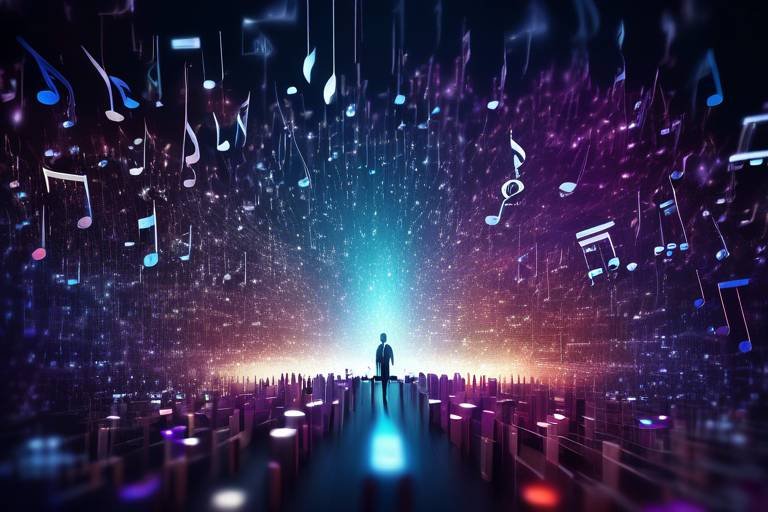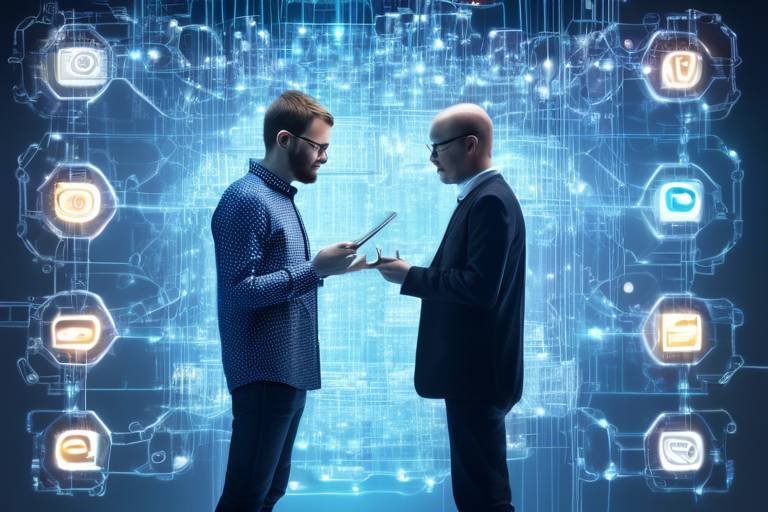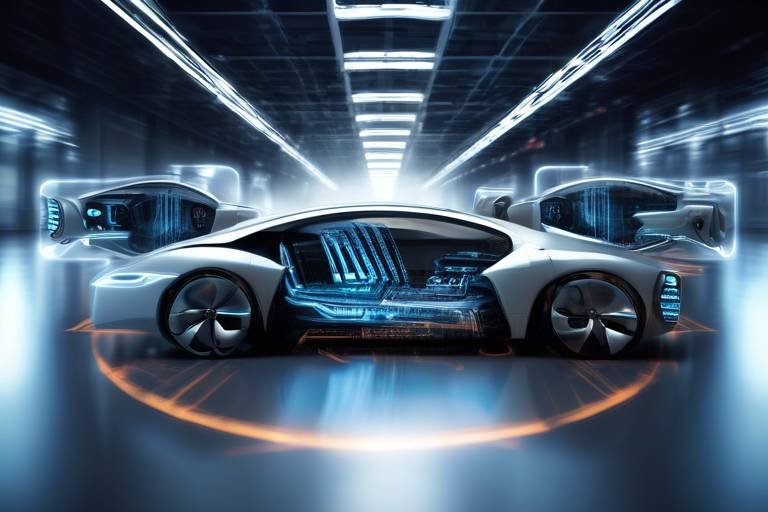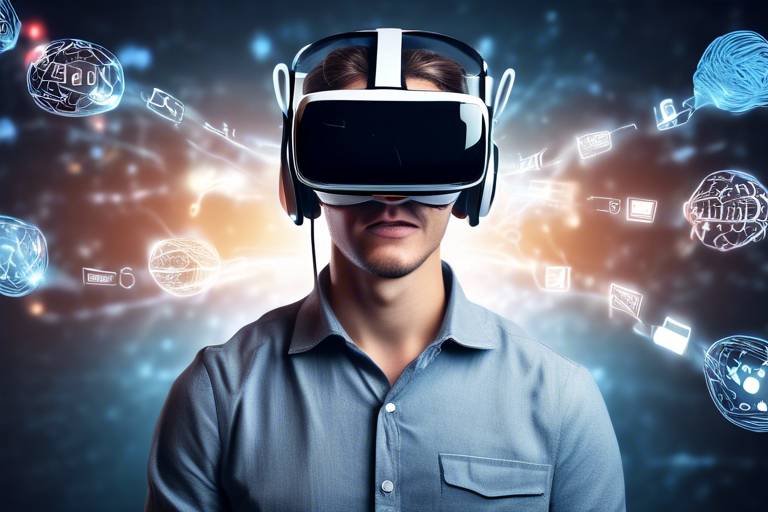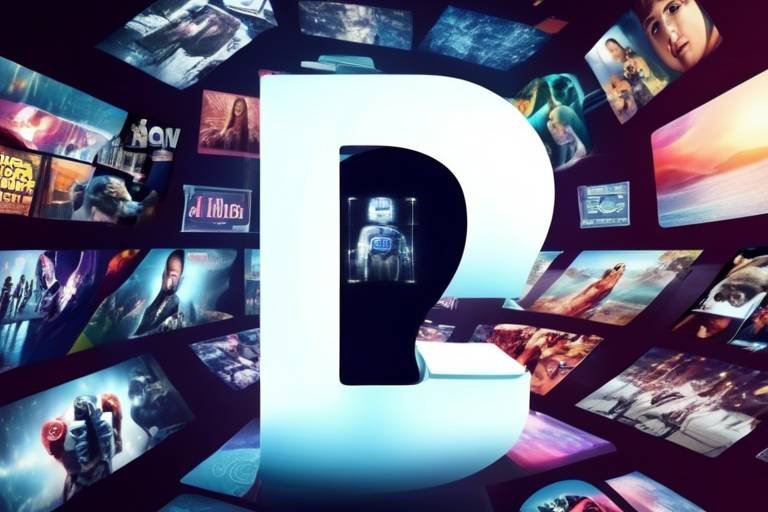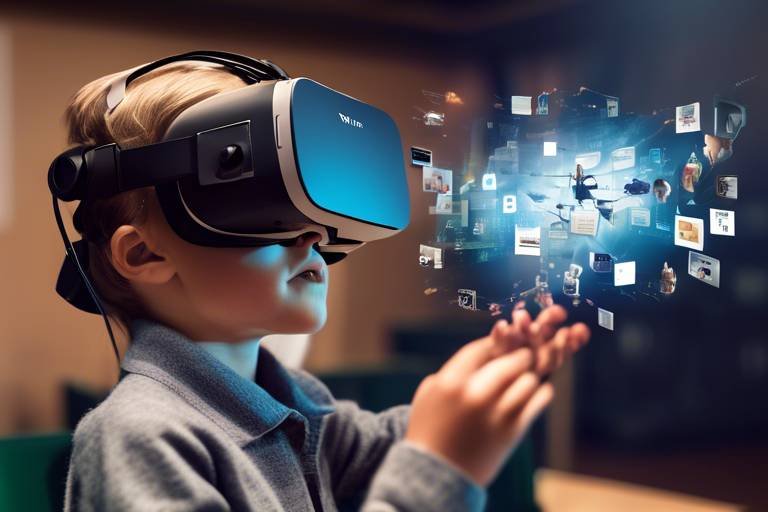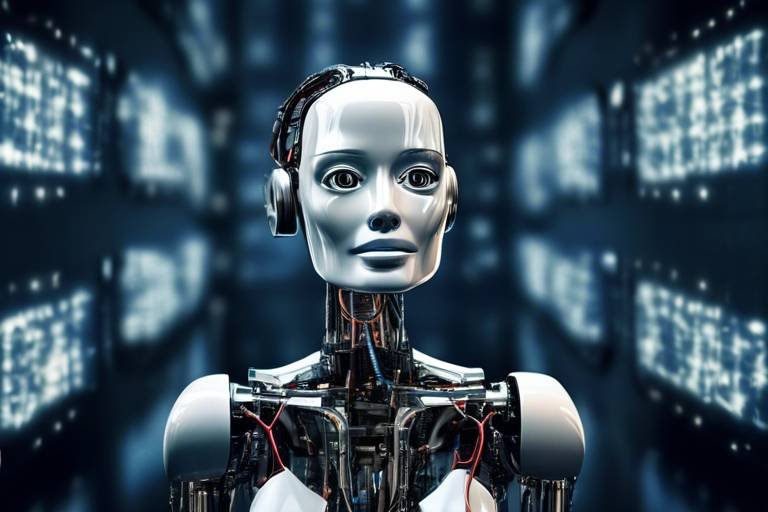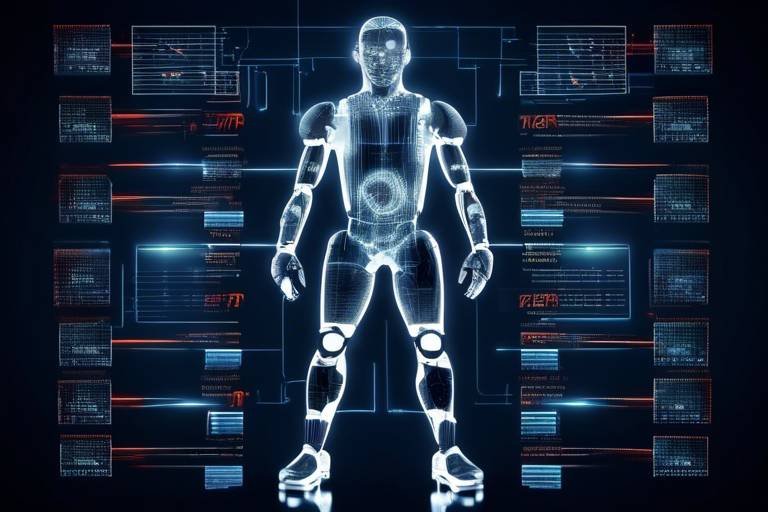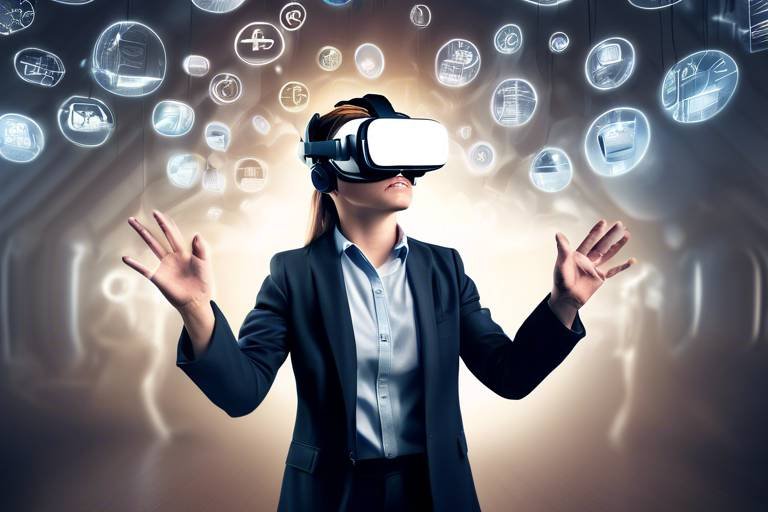The Future of Music: AI Composers
Welcome to the fascinating world where technology meets creativity! The rise of AI composers is reshaping how we think about music, and it’s not just a passing trend; it's a revolution. Imagine a future where machines compose symphonies that touch our hearts, create soundtracks for our favorite films, or even produce catchy pop hits. Sounds exciting, right? This article dives deep into the evolving role of AI in music composition, examining its potential to transform creativity, collaboration, and the music industry as a whole.
Over the past few years, AI technology has advanced at an astonishing rate, enabling machines to compose original music that can rival human creativity. What’s driving this surge? For starters, the availability of vast amounts of data and improved computing power have made it possible for AI to analyze and learn from existing music. Furthermore, the increasing interest in music technology has led to a surge in research and investment in AI-driven tools. With platforms like OpenAI's MuseNet and Google’s Magenta, we are witnessing a new era of music creation. But what does this mean for the future?
To truly appreciate the magic behind AI composers, we need to understand the mechanics at play. At the heart of AI music composition are sophisticated algorithms and extensive data sets. These algorithms enable AI to analyze patterns, genres, and styles, allowing it to generate music that is not only original but also resonates with listeners. But how does it all come together? Let’s break it down!
Machine learning is the backbone of AI music composition. By employing various techniques, AI can learn from existing music to generate new pieces. For instance, supervised learning allows AI to be trained on a labeled dataset, while unsupervised learning helps it find patterns in unlabelled data. The beauty of these techniques lies in their ability to adapt and evolve, just like human musicians. Imagine an AI that can listen to Beethoven and then create a brand-new symphony inspired by his style. Isn’t that mind-blowing?
One of the most exciting developments in AI music composition is the use of neural networks. These networks mimic the functions of the human brain, allowing AI to create unique musical patterns. By processing large amounts of data, neural networks can identify intricate relationships between notes, rhythms, and harmonies. This capability enables AI to compose music that feels both innovative and familiar. It’s like having a digital composer who understands the essence of music!
Another powerful tool in the AI composer’s toolkit is Generative Adversarial Networks (GANs). These networks consist of two competing systems: a generator that creates music and a discriminator that evaluates it. This dynamic competition pushes the generator to produce higher-quality, original music. The result? Stunning compositions that can evoke emotions and tell stories, all crafted by AI. It’s a thrilling example of how technology can enhance artistic expression!
The quality of music generated by AI heavily relies on the data it learns from. AI composers are trained on diverse data sources, including:
- Classical music databases
- Modern popular music
- World music genres
- Sound samples from various instruments
By analyzing this vast array of musical styles, AI can create compositions that blend genres and push the boundaries of traditional music. The more diverse the data, the more innovative the music!
As AI composers continue to evolve, they are changing the landscape for musicians. Artists are now faced with the exciting yet daunting task of adapting to these new technologies. Some musicians embrace AI as a collaborator, while others view it as a threat to their craft. The truth is, AI can be a powerful ally in the creative process, enabling artists to explore new avenues of expression and innovation.
The partnership between human musicians and AI can lead to groundbreaking creations. Imagine a band that uses AI to generate backing tracks, allowing them to focus on their live performances. Successful collaborations are already happening, with artists like Taryn Southern releasing albums co-created with AI. These partnerships demonstrate that the fusion of human creativity and machine intelligence can produce truly remarkable results.
Despite the benefits, musicians face challenges with AI integration. Concerns about originality, copyright, and the future of human creativity are at the forefront of this discussion. As AI-generated music becomes more prevalent, the line between human and machine-created art blurs, raising questions about the essence of creativity itself. Will we lose the human touch in music, or can AI enhance our artistic endeavors?
As AI becomes more prevalent in music, ethical concerns arise. The implications of AI-generated music on creativity and ownership are significant. Who owns a piece of music created by an AI? Is it the programmer, the user, or the AI itself? These questions challenge our understanding of authorship and intellectual property in the digital age.
Copyright laws struggle to keep pace with AI advancements. The complexities of ownership regarding AI-composed music create a legal gray area that artists and companies must navigate. As the music industry adapts to these changes, new frameworks for copyright will need to be established to protect both human and AI creators.
The rise of AI raises questions about authenticity. Can AI truly create music, or does it merely replicate existing styles? This debate is crucial as we define the future of music. While AI can generate impressive compositions, the question remains: does it have the ability to convey genuine emotion and storytelling like a human artist? The answer may shape the future of music as we know it.
Q: Can AI truly create original music?
A: Yes, AI can compose music that is original, although it often draws inspiration from existing works.
Q: How do musicians feel about AI in music?
A: Reactions vary; some embrace it as a tool for creativity, while others see it as a potential threat to their artistry.
Q: What are the copyright implications of AI-generated music?
A: Copyright laws are still evolving to address the complexities of ownership in AI-generated works.
Q: Will AI replace human musicians?
A: While AI can compose music, it is unlikely to replace human musicians entirely. Instead, it may serve as a collaborator and tool for inspiration.

The Rise of AI in Music
In recent years, the music landscape has experienced a seismic shift, one that can be largely attributed to the rapid advancements in artificial intelligence (AI). This technology has made its way into various industries, but the realm of music composition has been particularly impacted. So, what’s driving this revolution? Several factors contribute to the rise of AI in music, and understanding them can offer insights into the future of creativity.
First and foremost, the accessibility of data has played a crucial role. With the explosion of digital music platforms, there is now an abundance of music available for AI systems to analyze and learn from. This vast repository of information allows AI algorithms to identify patterns, styles, and structures that define different genres and artists. Imagine feeding an AI system a library filled with the works of Beethoven, The Beatles, and Billie Eilish; it can learn the nuances of each artist’s style and generate new compositions that reflect these influences.
Moreover, advancements in machine learning algorithms have made it easier for AI to create music that resonates with human emotions. As these algorithms evolve, they become better at understanding the intricacies of musical theory and composition. They can analyze what makes a song catchy or what evokes a particular feeling, allowing them to craft original pieces that can be surprisingly engaging. It's as if AI has become a digital composer, capable of weaving together melodies that can inspire and move listeners.
Additionally, the growing interest in collaboration between humans and AI is fostering a culture of innovation. Musicians are increasingly experimenting with AI tools, using them as collaborators rather than replacements. This partnership opens up new avenues for creativity, allowing artists to push the boundaries of their work. For instance, a musician might use AI to generate a backing track, which they then refine and enhance with their unique touch, creating a fusion of human and machine-made art.
Another factor fueling the rise of AI in music is the democratization of music production. With AI tools becoming more accessible and user-friendly, aspiring musicians can produce high-quality music without needing extensive training or expensive equipment. This shift not only empowers individual creators but also diversifies the music landscape, as more voices and styles emerge. In a way, AI is leveling the playing field, allowing anyone with a passion for music to express themselves creatively.
As we look to the future, it’s clear that AI is not just a passing trend; it’s a transformative force that is reshaping how we create and experience music. The potential for AI to enhance human creativity while also challenging our perceptions of artistry is both exciting and daunting. Will we embrace this new era of musical collaboration, or will we resist the change? Only time will tell, but one thing is certain: the rise of AI in music is just beginning, and its impact will be felt for generations to come.
- What is AI music composition? - AI music composition involves using artificial intelligence algorithms to create original music, often by learning from existing musical pieces.
- How does AI learn to compose music? - AI learns through machine learning techniques that analyze vast datasets of music to identify patterns and structures.
- Can AI replace human musicians? - While AI can create music, it is often seen as a tool for collaboration rather than a replacement for human creativity.
- What are the ethical concerns surrounding AI in music? - Concerns include copyright issues, the authenticity of AI-generated music, and the potential impact on human creativity.

How AI Composers Work
Understanding how AI composers function is like peeling back the layers of an onion; at first glance, it may seem straightforward, but as you delve deeper, you'll discover intricate mechanisms that drive their creativity. At the core of AI music composition lies a blend of sophisticated algorithms and vast data sets that empower machines to generate original musical pieces. These algorithms are designed to analyze existing music, learning patterns, structures, and styles, which they then use to craft something entirely new.
One of the most fascinating aspects of AI composers is their reliance on machine learning techniques. Imagine teaching a child to play an instrument; you start by exposing them to various songs and genres, allowing them to absorb the nuances of rhythm, melody, and harmony. Similarly, AI systems undergo a training process where they are fed a plethora of musical compositions, enabling them to identify and replicate the elements that make music appealing. This process can be likened to a musical education, where the AI learns not just to mimic but to innovate based on its understanding of music theory and human emotion.
Within the realm of machine learning, several techniques play pivotal roles in AI music composition. For instance, neural networks serve as the backbone of many AI composers. These networks function similarly to the human brain, consisting of interconnected nodes that process information. By analyzing vast amounts of data, neural networks can recognize intricate patterns and relationships within music, allowing them to generate unique compositions that resonate with listeners. The beauty of this technology lies in its ability to produce music that feels both familiar and refreshingly original.
Neural networks are particularly effective in music composition due to their ability to learn from examples. When trained on a diverse range of musical styles, they can create new pieces that reflect the essence of those styles while introducing innovative twists. For example, an AI trained on classical music might generate a piece that incorporates traditional elements while infusing modern sounds, creating a bridge between the past and the present.
Another groundbreaking approach in AI music creation is the use of Generative Adversarial Networks (GANs). These networks consist of two competing models: a generator and a discriminator. The generator creates new music, while the discriminator evaluates its quality based on established criteria. This competition drives both models to improve continuously, resulting in high-quality, original compositions. The dynamic interplay between the generator and discriminator can be likened to a friendly rivalry between two musicians, each pushing the other to elevate their craft.
The quality of the music produced by AI composers heavily relies on the data they learn from. Just as a chef needs high-quality ingredients to create a delicious dish, AI requires a rich dataset to compose engaging music. These data sources can include:
- Public domain music libraries
- Commercially licensed tracks
- Musical scores from various genres
- Live performances and recordings
By utilizing diverse data sources, AI composers can develop a more comprehensive understanding of music, enabling them to create pieces that appeal to a wide audience. This ability to learn from a vast array of influences is what sets AI composers apart, making them a powerful force in the evolving landscape of music.
Q: Can AI composers create music that is truly original?
A: Yes, AI composers can generate original music by learning from existing compositions and combining various styles and elements in innovative ways.
Q: How do AI composers handle different musical genres?
A: AI composers are trained on diverse datasets that include various genres, allowing them to understand and create music across different styles.
Q: Are there any limitations to AI music composition?
A: While AI can generate impressive music, it may lack the emotional depth and personal touch that human musicians bring to their work. The collaboration between humans and AI often leads to the most compelling results.

Machine Learning Techniques
When we talk about AI composers, we can't overlook the incredible role that machine learning plays in their development. Essentially, machine learning is a subset of artificial intelligence that allows systems to learn from data and improve over time without being explicitly programmed. This means that AI can analyze vast amounts of musical data, recognize patterns, and generate new compositions that reflect the styles and nuances it has learned. Imagine teaching a child to play music by exposing them to different genres and artists; that's exactly how AI learns too!
There are several key techniques within machine learning that fuel the creativity of AI composers. These include:
- Supervised Learning: In this approach, AI is trained on labeled datasets, meaning that each piece of music has been categorized and annotated. By learning from these examples, AI can understand the features that define different genres or styles.
- Unsupervised Learning: Here, the AI analyzes data without any labels. It identifies patterns and groupings within the music, allowing it to create new combinations that may not have been directly taught.
- Reinforcement Learning: This technique involves AI learning through trial and error. It receives feedback on its compositions, gradually improving as it understands what works and what doesn’t.
Each of these techniques contributes to the AI's ability to generate music that not only sounds good but also resonates with listeners. For example, supervised learning can help an AI composer understand the emotional weight of a minor chord versus a major chord, while unsupervised learning can lead to innovative fusions of styles that might not be immediately obvious to human composers.
Moreover, the use of neural networks enhances these machine learning techniques. These networks are designed to simulate the way the human brain processes information, making them particularly effective in recognizing complex patterns in music. By utilizing layers of interconnected nodes, neural networks can analyze audio data, extracting features like pitch, rhythm, and harmony, which are crucial for music composition.
In addition to neural networks, another powerful tool is the Generative Adversarial Network (GAN). GANs consist of two neural networks—the generator and the discriminator—that work against each other. The generator creates new music, while the discriminator evaluates its authenticity. This competition pushes the generator to produce increasingly sophisticated compositions, leading to high-quality, original music that can surprise even seasoned musicians.
As we continue to explore the potential of machine learning in music composition, the possibilities seem endless. The combination of these techniques not only allows AI to create music but also opens new avenues for collaboration between human musicians and AI, paving the way for a future where creativity knows no bounds.
- What is machine learning in music composition? Machine learning in music composition refers to the use of algorithms that enable computers to learn from musical data and create new music based on that learning.
- How do AI composers learn? AI composers learn through various techniques, including supervised learning, unsupervised learning, and reinforcement learning, allowing them to analyze and generate music.
- What are neural networks? Neural networks are computational models inspired by the human brain that help AI recognize patterns and generate music.

Neural Networks
Neural networks are at the heart of modern AI music composition, serving as the backbone that allows machines to learn and create. These networks are designed to mimic the way human brains process information, making them incredibly effective at identifying patterns and generating new musical ideas. Think of a neural network as a complex web of interconnected nodes, each one representing a tiny piece of information, much like neurons in the brain. When fed with data, these networks can analyze and synthesize sounds, rhythms, and melodies, leading to the creation of entirely original compositions.
One of the key strengths of neural networks lies in their ability to learn from vast amounts of existing music. By examining different genres, styles, and structures, they can develop a nuanced understanding of what makes music appealing. This learning process often involves the use of deep learning techniques, where multiple layers of nodes process information in increasingly abstract ways. For instance, the first layer might analyze basic elements like pitch and tempo, while deeper layers might focus on more complex aspects such as harmony and emotional tone.
To illustrate how neural networks function in music composition, consider the following example: imagine a neural network trained on a dataset of classical symphonies. Initially, it may struggle to produce anything coherent, but as it processes more data, it begins to identify patterns—recognizing that certain chord progressions evoke specific emotions, or that certain instruments work well together. Over time, it can generate new symphonic pieces that, while original, echo the characteristics of the works it learned from.
However, the effectiveness of neural networks in music creation depends significantly on the quality and diversity of the data they are trained on. If a neural network only learns from a narrow range of musical styles, its output may lack the richness and variety that comes from a broader musical education. This brings us to the importance of curating diverse datasets for training AI composers, ensuring that the music they create is not only innovative but also resonates with a wide audience.
In conclusion, neural networks represent a fascinating intersection of technology and creativity. As these systems continue to evolve, they hold the potential to revolutionize the music industry, offering new tools for artists and composers. The future of music, enhanced by the capabilities of AI, is not just about machines creating sound; it's about a collaborative landscape where human creativity and artificial intelligence intertwine to produce something truly extraordinary.

Generative Adversarial Networks (GANs)
Generative Adversarial Networks, or GANs, are a groundbreaking innovation in the realm of artificial intelligence, particularly in music composition. Imagine a scenario where two artists are in a creative duel: one is a generator that creates new music pieces, while the other is a discriminator that critiques and evaluates the generated music. This dynamic interplay is the essence of GANs, where both components work together to produce music that is not just original but also resonates with the emotional depth and structure found in human compositions.
The generator in a GAN is tasked with crafting new musical compositions based on a dataset of existing music. It employs various algorithms to understand patterns, styles, and structures inherent in the music it has learned from. On the flip side, the discriminator's role is to assess the quality of the generated music, determining whether it is authentic and comparable to human-created pieces. This feedback loop creates a unique environment where the generator continuously improves its output based on the discriminator's evaluations.
One of the remarkable aspects of GANs is their ability to produce high-quality music that often surprises listeners. The process can be likened to a chef experimenting with flavors; the generator tries different combinations, while the discriminator acts as a taste tester, guiding the chef towards a more refined dish. Over time, this collaboration can yield compositions that are not only innovative but also evoke emotional responses similar to traditional music.
Moreover, GANs have the potential to revolutionize the music industry by democratizing music creation. Artists without extensive training can leverage GAN technology to produce professional-sounding music, enabling a broader range of voices and styles to emerge in the industry. This accessibility can lead to a more diverse musical landscape, where creativity knows no bounds.
However, as we embrace the power of GANs in music composition, it is essential to consider the implications of this technology. Issues such as copyright and originality come to the forefront, prompting discussions about the ownership of AI-generated music. As we navigate this new terrain, finding a balance between innovation and ethical considerations will be crucial for the future of music.
In conclusion, Generative Adversarial Networks represent a significant leap in the capabilities of AI composers. By mimicking the creative process of human musicians, GANs not only enhance the quality of music production but also challenge our understanding of creativity itself. As this technology continues to evolve, it will undoubtedly shape the future of music in ways we are just beginning to explore.
- What are GANs? GANs are a type of artificial intelligence that consists of two neural networks, the generator and the discriminator, that work together to create new content.
- How do GANs create music? GANs generate music by learning from existing pieces, creating new compositions, and refining them through feedback from the discriminator.
- Can AI-generated music be considered original? This is a complex issue; while AI can create unique compositions, questions about originality and ownership remain a topic of debate.
- What impact do GANs have on musicians? GANs can enhance creativity and collaboration, but they also pose challenges related to copyright and the authenticity of music.

Data Sources for AI Composers
When it comes to AI composers, the magic largely lies in the data they consume. Just like a chef needs quality ingredients to whip up a delicious meal, AI requires a rich variety of musical data to create compelling compositions. This data can come from numerous sources, each contributing to the AI's ability to understand and generate music. The most common data sources include:
- Music Databases: Large repositories of existing music, such as Spotify, SoundCloud, and iTunes, provide vast amounts of audio files that AI can analyze. These platforms often have millions of tracks across various genres, allowing AI to learn diverse musical styles.
- Sheet Music Collections: Digital libraries containing notated music, such as IMSLP (International Music Score Library Project), offer structured data that helps AI understand the theoretical aspects of music composition, such as harmony and melody.
- Live Performances: Recordings from concerts and live shows can serve as dynamic data sources. AI can analyze how musicians improvise and interact with each other, capturing the essence of live music.
- User-Generated Content: Platforms like YouTube and Bandcamp allow artists to share their creations. AI can learn from the vast array of original works submitted by independent musicians, gaining insights into contemporary trends.
Moreover, the quality of the data is just as critical as the quantity. AI models thrive on diverse and high-quality datasets that encompass a wide range of musical genres, styles, and cultural contexts. This diversity enables AI to generate compositions that are not only original but also resonate with various audiences. For instance, an AI trained on classical music might struggle to create a catchy pop tune without exposure to contemporary styles.
To ensure the AI's output is both innovative and relevant, developers often employ a technique called data augmentation. This involves manipulating existing data to create new variations, such as changing the tempo, key, or instrumentation of a piece. By doing this, AI composers can expand their creative toolkit and produce unique sounds that push the boundaries of traditional music.
In summary, the data sources for AI composers are as varied as the music they create. From vast online databases to live recordings and user-generated content, these resources provide the foundation for AI's musical learning. As technology evolves, the way we gather and utilize musical data will undoubtedly shape the future of music composition.

The Impact on Musicians
The rise of AI composers is not just a technological marvel; it's a phenomenon that is reshaping the entire music landscape. For many musicians, this shift brings both exciting opportunities and daunting challenges. Imagine waking up to a world where your creative partner is a machine, capable of generating melodies and harmonies in seconds. This is the reality many artists are facing today. While some musicians embrace this new wave of collaboration, others are left wondering how they fit into a world where algorithms can create what was once considered the sole domain of human creativity.
One of the most significant impacts of AI on musicians is the potential for collaboration. Artists can now partner with AI tools to enhance their creative process. For instance, a songwriter might input a few chords into an AI program, which then generates various melodies that the songwriter can choose from or modify. This collaboration can lead to innovative and unique compositions that might not have been possible otherwise. The blend of human emotion and machine precision can create a soundscape that is fresh and exciting.
However, this partnership is not without its complications. Many musicians express concerns about the authenticity of music created with AI assistance. Questions arise: Does using AI diminish the value of human creativity? Can a machine truly understand the emotional depth of music? These are valid concerns, as the essence of music often lies in personal experiences and emotions that machines simply cannot replicate. Moreover, the fear of being overshadowed by AI-generated content looms large. With AI capable of producing high-quality music at an unprecedented rate, will human musicians be able to compete?
Another challenge musicians face is the economic impact of AI in the music industry. As AI tools become more accessible, the cost of music production may decrease, leading to an oversaturated market. This could make it harder for individual artists to stand out amidst a sea of AI-generated music. Additionally, traditional revenue streams, such as live performances and album sales, may also be affected as more consumers turn to AI-generated playlists and compositions.
To navigate this evolving landscape, musicians are exploring new ways to incorporate AI into their work. Some are using AI as a tool for inspiration, while others are leveraging it for production efficiencies. For example, a musician might use AI to analyze trends in popular music, helping them to craft songs that resonate with current audiences. This strategic use of AI can empower artists to stay relevant in a rapidly changing industry.
Despite the challenges, the potential for innovation is immense. A growing number of musicians are embracing AI as a co-creator, leading to a renaissance of musical styles and genres. By blending human creativity with AI's analytical capabilities, artists can push the boundaries of what music can be. The future of music may very well lie in the synergy between human ingenuity and artificial intelligence.
In conclusion, the impact of AI on musicians is profound and multifaceted. While it presents challenges related to authenticity, economic viability, and competition, it also opens doors to unprecedented collaboration and creativity. As the music industry continues to evolve, it will be fascinating to see how artists adapt and thrive in this new era.
- How can musicians effectively collaborate with AI?
Musicians can use AI tools to generate ideas, melodies, or even entire compositions that they can then refine and personalize, creating a unique blend of human and machine creativity. - Will AI replace human musicians?
While AI can produce music, it lacks the emotional depth and personal experiences that human musicians bring to their art. Instead of replacement, AI is more likely to serve as a tool for enhancement. - What are the ethical concerns regarding AI in music?
Concerns include issues of copyright, authenticity, and the potential for AI to overshadow human creativity, raising questions about ownership and the value of human-made art.

Collaboration Between Humans and AI
In the ever-evolving landscape of music, the collaboration between human musicians and AI composers is transforming the way we create and experience sound. Imagine a world where a talented musician sits side by side with an AI, brainstorming melodies and harmonies, each contributing their unique strengths to craft something truly remarkable. This partnership is not just a futuristic fantasy; it’s happening right now, and the results are nothing short of astonishing.
One of the most exciting aspects of this collaboration is the ability to blend the emotional depth of human creativity with the computational prowess of AI. While humans bring their life experiences, emotions, and artistic intuition to the table, AI contributes its ability to analyze vast amounts of data and generate innovative ideas. This synergy allows for the creation of music that resonates on a deeper level, appealing to diverse audiences.
Take, for example, the collaboration between renowned musicians and AI platforms. Artists like Holly Herndon have experimented with AI to produce groundbreaking works that challenge our perceptions of authorship and creativity. Herndon’s AI, named Spawn, learns from her vocal style and generates new vocal patterns, resulting in a unique sound that is both familiar and avant-garde. Such collaborations not only push the boundaries of music but also invite listeners to engage with the art in new ways.
However, it’s essential to recognize that these partnerships are not without their challenges. Musicians often grapple with questions about authenticity and the essence of creativity. Can a machine truly understand the emotional nuances of a piece, or is it merely mimicking patterns it has learned? These discussions are vital as they shape the future of music and the role of AI within it.
Moreover, the collaboration between humans and AI can lead to unprecedented innovation in various genres. For instance, in electronic music, AI tools can help artists explore new soundscapes and textures that would be difficult to achieve manually. By leveraging AI, musicians can experiment with different styles, creating hybrid genres that blend the best of both worlds. This kind of experimentation is crucial in keeping the music industry dynamic and fresh.
As we look to the future, it’s clear that the relationship between musicians and AI will continue to evolve. The potential for collaborative creativity is vast, and as technology advances, we can expect even more sophisticated partnerships. To navigate this new terrain, artists will need to embrace the possibilities while remaining grounded in their unique artistic voices.
In conclusion, the collaboration between humans and AI is not just a trend; it's a revolution in the music industry. By working together, they can create music that is richer, more diverse, and profoundly impactful. As we continue to explore this fascinating relationship, one thing is certain: the future of music is a harmonious blend of human ingenuity and artificial intelligence.
- What is AI music composition? - AI music composition refers to the use of artificial intelligence technologies to create original music.
- How does AI collaborate with human musicians? - AI can analyze existing music, generate new ideas, and assist musicians in the creative process, leading to innovative compositions.
- Are AI-generated songs considered original? - This is a debated topic, as originality can depend on the data used to train the AI and the creative input from human collaborators.
- What are the ethical implications of AI in music? - Ethical concerns include copyright issues, authenticity, and the potential impact on human creativity.

Challenges Faced by Musicians
As the world of music evolves with the introduction of AI composers, musicians find themselves navigating a landscape that is both exciting and daunting. The integration of artificial intelligence into music creation has sparked a revolution, but it also brings a unique set of challenges that artists must confront. One of the most pressing issues is the concern over originality. With AI capable of analyzing countless pieces of music and generating new compositions, musicians often wonder: can they truly create something original in an age where machines can replicate and remix existing works?
Moreover, the question of copyright looms large. As AI-generated music becomes more prevalent, the legal frameworks governing intellectual property struggle to keep pace. Who owns a song created by an AI? Is it the programmer, the user, or the AI itself? These questions create a murky environment for musicians who fear that their own works may be overshadowed or even appropriated by AI systems. The complexity of copyright in the age of AI can lead to a chilling effect on creativity, as artists worry about potential legal repercussions.
Another challenge is the perception of value. In a world where music can be generated in seconds by an AI, the intrinsic value of human-created music may be called into question. Many musicians fear that audiences might begin to favor AI compositions over their own, leading to a devaluation of their art. This shift could impact not only their income but also their motivation to create. After all, if a machine can churn out catchy tunes with minimal effort, what does that mean for the artist's craft?
Despite these challenges, many musicians are finding ways to adapt. Some are embracing AI as a tool rather than viewing it as a threat. By collaborating with AI systems, they can enhance their creativity and explore new musical territories. However, this requires a mindset shift, where artists must be willing to integrate technology into their creative processes while maintaining their unique voices. The balance between human creativity and machine assistance is delicate, and finding that sweet spot is essential for artists moving forward.
In summary, while AI composers offer exciting possibilities for the music industry, they also present significant challenges for musicians. From issues of originality and copyright to concerns about the perceived value of their work, artists must navigate a complex landscape. The future of music may very well depend on how musicians choose to engage with these technologies, transforming challenges into opportunities for innovation and collaboration.
- What are the main challenges musicians face with AI composers?
Musicians grapple with issues of originality, copyright, and the perceived value of their work in a landscape increasingly dominated by AI-generated music. - How can musicians adapt to the rise of AI in music?
By embracing AI as a collaborative tool, musicians can enhance their creativity and explore new musical avenues while maintaining their unique artistic identity. - What are the copyright implications of AI-generated music?
The ownership of AI-composed music is complex, with questions surrounding whether it belongs to the programmer, the user, or the AI itself. - Can AI truly create original music?
While AI can generate new compositions, there is ongoing debate about whether it can create truly original music or merely replicate existing styles.

Ethical Considerations in AI Music
As the integration of AI in music composition becomes more prominent, it raises several ethical considerations that cannot be ignored. The very essence of creativity, ownership, and authenticity is being challenged by the capabilities of AI. One of the most pressing issues is the question of copyright. Who owns a piece of music generated by an AI composer? Is it the programmer, the user, or the AI itself? Current copyright laws are struggling to keep pace with these advancements, leading to a complex web of legal challenges.
Moreover, the emergence of AI in music has sparked a heated debate over authenticity. Can music created by algorithms be considered "real" art? Many argue that music is an inherently human expression, deeply tied to emotions and experiences. AI, on the other hand, operates based on data and patterns, which raises the question: can it truly understand the nuances of human emotion? This ongoing discussion highlights the delicate balance between technological innovation and the preservation of human creativity.
Additionally, the rapid growth of AI in the music industry has led to concerns about job displacement. As AI tools become more capable of producing high-quality music, musicians may find themselves competing with machines, which could lead to a decline in opportunities for human artists. This potential shift prompts us to consider how we can foster collaboration between humans and AI rather than viewing them as adversaries. By embracing AI as a tool for enhancement rather than replacement, we can encourage a more harmonious relationship between technology and artistry.
Furthermore, the ethical implications extend to the data sources used to train AI composers. If these systems learn from existing works, there's a risk of unintentionally replicating styles or even plagiarizing other artists' creations. This raises significant questions about the originality of AI-generated music and the responsibility of developers to ensure that their algorithms respect the creative rights of human musicians.
In summary, the ethical considerations surrounding AI in music are multi-faceted and complex. As we navigate this new landscape, it is crucial to engage in open discussions about the implications of AI on creativity, ownership, and the future of music. By doing so, we can strive for a future where technology and human artistry coexist, enhancing rather than diminishing the creative spirit.
- What are the main ethical concerns regarding AI in music?
The main concerns include copyright issues, authenticity of AI-generated music, job displacement for musicians, and the originality of compositions created by AI. - Can AI truly create original music?
While AI can generate music based on patterns and data, whether it can create "original" music in the human sense is still a matter of debate. - How can musicians collaborate with AI?
Musicians can use AI as a tool to enhance their creativity, experimenting with new sounds and ideas that AI can help generate. - What should be done about copyright laws and AI?
There is a need for updated copyright laws that address the complexities of AI-generated music and clarify ownership rights.

Copyright Issues
As the world of music evolves with the integration of artificial intelligence, have emerged as a significant concern. The rapid development of AI composers has raised questions about who owns the rights to music that is created by machines. Is it the programmer who developed the AI, the artist who collaborated with it, or the AI itself? These questions are not merely academic; they have real implications for the music industry and the livelihoods of musicians.
Traditionally, copyright law has been designed to protect the rights of human creators. However, AI-generated music complicates this framework. For instance, if an AI composes a song based on a dataset of existing music, does that song infringe on the copyrights of the original works? The complexity of ownership becomes even more pronounced when we consider the following:
- Originality: Copyright law typically requires a work to be original and fixed in a tangible medium. But how do we define originality when a machine generates music based on learned patterns?
- Attribution: If an AI creates a piece of music, who should be credited? The programmer, the user, or the AI itself?
- Licensing: How do we license AI-generated music? Current licensing frameworks may not adequately cover these new creations.
Moreover, the U.S. Copyright Office has not yet established clear guidelines for AI-generated works. In 2019, a notable case involved an AI named "AIVA," which was recognized for its compositions, yet the ownership of those works remained ambiguous. This lack of clarity leaves both artists and developers in a state of uncertainty, as they navigate a legal landscape that has yet to fully adapt to the realities of AI in music.
As we move forward, it is crucial for stakeholders in the music industry—musicians, producers, and legal experts—to engage in discussions about how to update copyright laws to accommodate the new wave of AI-generated content. The goal should be to protect human creativity while also recognizing the unique contributions that AI can make to the art of music composition.
In conclusion, as AI composers continue to push the boundaries of creativity, the surrounding their work must be addressed. Striking a balance between protecting the rights of human creators and embracing the innovations brought forth by AI will be essential for the future of the music industry.
- Who owns the copyright to AI-generated music? The ownership of AI-generated music is still a legal gray area, with potential rights belonging to the programmer, the user, or possibly no one at all.
- Can AI infringe on existing copyrights? Yes, if an AI is trained on copyrighted material, it may produce works that infringe on those copyrights.
- What are the implications for musicians? Musicians may face challenges in asserting their rights and protecting their work in a landscape where AI is increasingly involved in music creation.

Authenticity and Creativity
The advent of AI in music composition has sparked an intriguing debate about authenticity and creativity. Can a machine truly create music, or is it merely a sophisticated mimic, echoing the sounds of its human predecessors? This question is pivotal as we navigate the evolving landscape of music technology. On one hand, AI composers can generate melodies and harmonies that are technically impressive and often emotionally resonant. However, the crux of the matter lies in the intent and experience behind the music. While AI can churn out tracks that may sound beautiful, they lack the personal stories and human experiences that often inform a musician's work.
Consider this: a human composer draws from a well of emotions, life experiences, and cultural influences to create a piece of music that resonates on a deeper level. In contrast, AI relies on algorithms and data sets, analyzing patterns from existing music to generate new compositions. This raises a fundamental question: does the absence of human experience in AI-generated music render it less authentic? Many argue that authenticity is not merely about the source of creation but also about the emotional connection it fosters with the audience.
Moreover, the debate extends to the notion of creativity. Traditional views of creativity often emphasize originality and the ability to express unique thoughts and feelings. AI, however, operates within the confines of its programming and the data it learns from. It can remix existing styles and create variations, but can it truly innovate? Some experts argue that AI can assist in the creative process, serving as a tool that enhances human creativity rather than replacing it. This collaboration can lead to exciting new genres and sounds, pushing the boundaries of what music can be.
As we delve deeper into this topic, it becomes clear that the relationship between AI and music is complex. It intertwines with broader questions about the nature of art itself. Is art defined by the creator's intent, or is it the audience's interpretation that matters most? In this context, AI-generated music challenges our conventional understanding of creativity and authenticity. It invites us to rethink what it means to create and appreciate music in an age where machines can compose symphonies.
In conclusion, while AI composers may not replace the emotional depth of human musicians, they certainly contribute to a fascinating evolution in the music landscape. The future may not be about choosing between human and AI creativity, but rather about finding a harmonious balance between the two, where technology enhances the artistry of human expression. The journey ahead is bound to be exciting, as we explore the uncharted territories of sound and creativity.
- Can AI compose music that is emotionally resonant?
Yes, AI can generate music that sounds emotionally impactful, but it lacks the personal experiences that human composers bring to their work.
- Is AI music considered original?
AI music is often considered a remix of existing styles, as it learns from data sets rather than creating from personal inspiration.
- How does AI influence human creativity?
AI can act as a tool for human musicians, helping them explore new ideas and sounds, thus enhancing their creative process.
- What are the ethical implications of AI in music?
Ethical concerns include copyright issues and the question of whether AI-generated music can be considered authentic art.
Frequently Asked Questions
- What is an AI composer?
An AI composer is a software program that utilizes artificial intelligence algorithms to create original music. These composers analyze existing music patterns and styles to generate new compositions, often mimicking human creativity in the process.
- How does AI create music?
AI creates music through complex algorithms and machine learning techniques. By using large datasets of existing music, AI learns different styles, structures, and patterns, which it then combines to compose unique pieces. Techniques like neural networks and generative adversarial networks (GANs) play a significant role in this process.
- Can AI composers replace human musicians?
While AI composers can generate music, they are not likely to replace human musicians entirely. Instead, they serve as tools for collaboration, enhancing creativity and allowing artists to explore new musical avenues. The partnership between humans and AI often leads to innovative works that neither could achieve alone.
- What are the ethical concerns surrounding AI music?
Ethical concerns include issues of copyright, ownership, and the authenticity of AI-generated music. As AI continues to evolve, questions arise about who owns the rights to music created by machines and whether AI can truly create original works or merely replicate existing styles.
- Are there copyright issues with AI-composed music?
Yes, copyright issues are a significant concern in the realm of AI-composed music. Current copyright laws struggle to address the complexities of ownership when music is created by AI. This ambiguity raises questions about how to protect the rights of human musicians and the creators of the AI itself.
- What role do machine learning techniques play in AI music composition?
Machine learning techniques are fundamental to AI music composition. They enable AI to analyze vast amounts of musical data, learn from it, and identify patterns that inform its compositions. Techniques such as deep learning and reinforcement learning enhance the AI's ability to produce high-quality music.
- Can AI composers work with human musicians?
Absolutely! AI composers can collaborate with human musicians, leading to exciting and innovative musical creations. Many artists are already experimenting with AI tools to enhance their songwriting and production processes, resulting in a fusion of human creativity and machine-generated sound.

